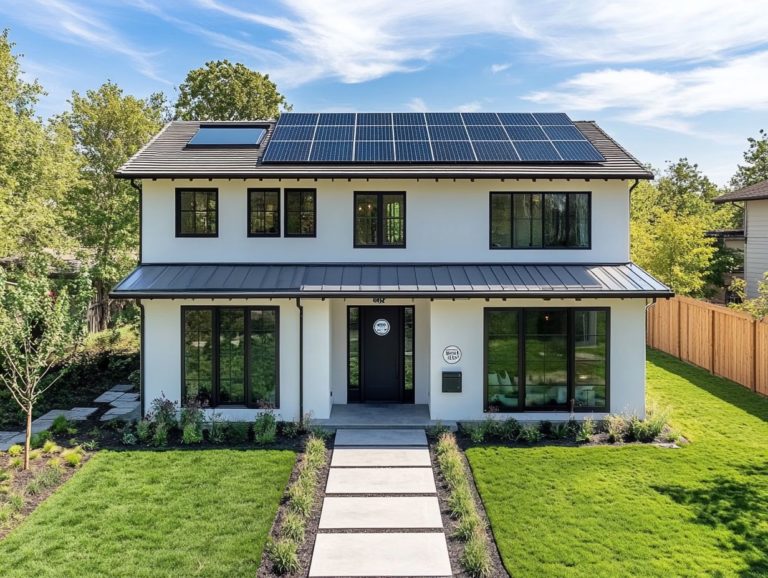How to Plan for Solar Panel Installation?
Are you contemplating the transformative potential of solar energy for your home! This guide will expertly navigate you through the essential steps for planning your solar panel installation.
You ll delve into understanding the myriad benefits of solar energy and evaluate your specific energy needs. Additionally, you ll choose the right company to partner with, all while navigating the installation process with confidence.
You will also uncover valuable tips for maintaining your panels and gain insights into the financial aspects, ensuring you make a well-informed decision. Prepare to illuminate your path to solar success!
Contents
- Key Takeaways:
- Benefits of Solar Energy
- Factors to Consider Before Installing Solar Panels
- Preparing for Solar Panel Installation
- Installation Process
- Maintaining and Monitoring Your Solar Panels
- Financial Considerations
- Frequently Asked Questions
- What factors should I consider before planning for solar panel installation?
- What are the steps involved in planning for solar panel installation?
- How can I determine the size of the solar panel system I need?
- What type of maintenance is required for solar panels?
- How do I choose a reputable installer for my solar panel installation?
- What are the available incentives and rebates for solar panel installation?
Key Takeaways:
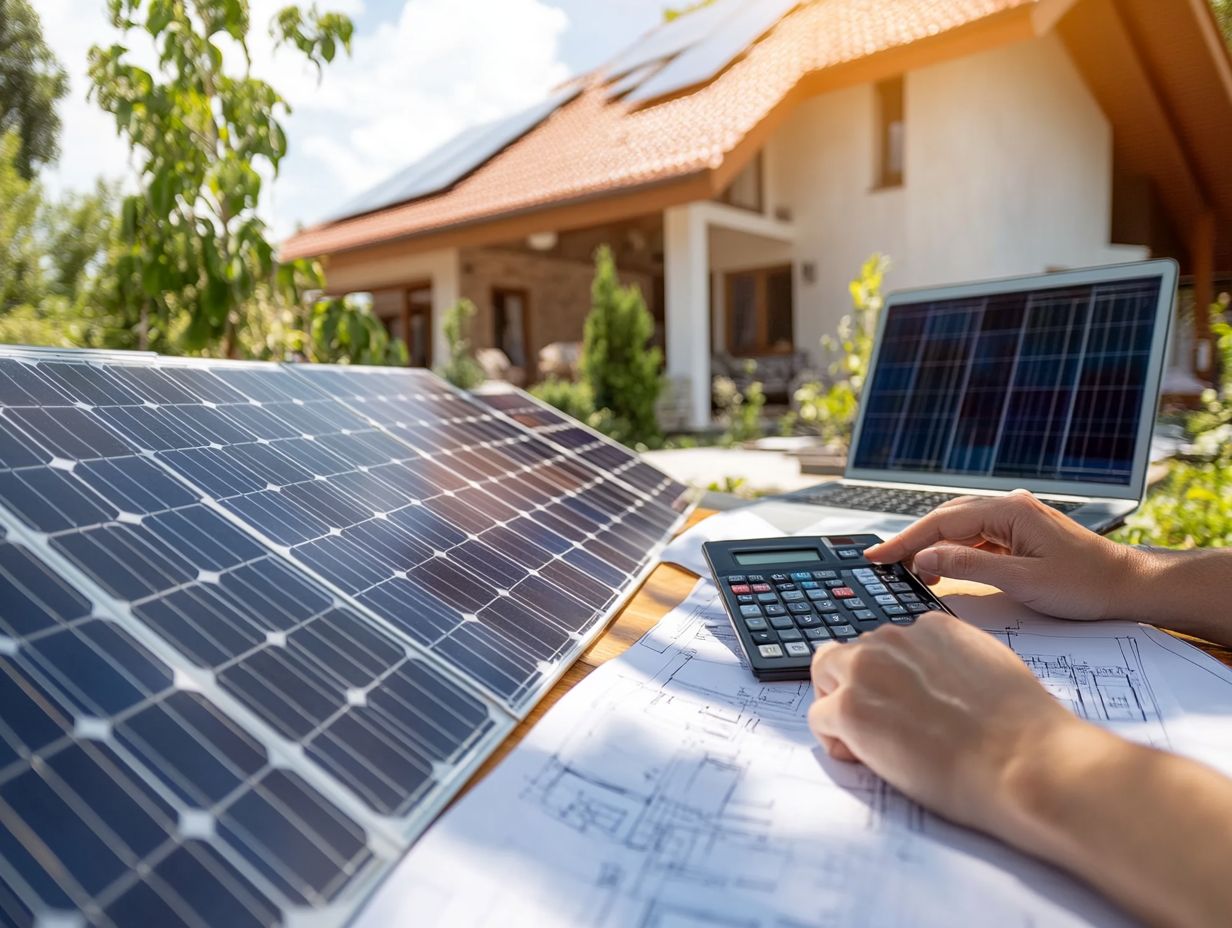
Assess your energy needs and choose a reputable solar panel company to ensure a successful installation.
Follow a step-by-step guide to properly install solar panels and regularly maintain and monitor them for optimal performance and longevity.
Consider the costs and potential savings of solar panel installation to make an informed financial decision.
Benefits of Solar Energy
Solar energy has become a standout player in the realm of renewable energy, bringing a wealth of benefits that can elevate both your environmental impact and financial well-being.
By harnessing the sun s power through solar panels, you can enjoy considerable energy savings and slash your electric bills. You can also capitalize on federal tax credits and solar incentives. Transitioning to a solar power system not only aids in creating a more sustainable future by reducing reliance on fossil fuels, but also helps lower your carbon footprint. It truly is a win-win for you and the planet.
Thanks to federal tax credits, you can save upwards of 30% on installation costs. The U.S. Department of Energy reports that homes outfitted with solar panels can cut their electricity bills by an impressive 50-80%. This innovative technology captures sunlight and converts it into usable electricity, granting you energy independence and protection against rising utility rates.
Many states sweeten the deal with additional rebates and incentives that can significantly reduce your upfront costs, like California s SGIP program, which offers rebates for solar energy storage.
Embracing solar energy means you re stepping towards a cleaner future while actively fighting climate change! Not only do you take a step toward cleaner energy, but you also play a vital role in drastically reducing greenhouse gas emissions, fostering a healthier planet for generations to come.
Factors to Consider Before Installing Solar Panels
Before you decide to install solar panels, take a moment to evaluate several critical factors that will determine the best outcome for your energy needs and financial investment. Conducting a comprehensive energy audit allows you to assess your current energy consumption and identify the ideal solar system size to meet those requirements.
Selecting a reputable solar company and comparing quotes from multiple qualified installers will not only streamline the installation process but also maximize your potential savings and benefits from solar energy.
Along with understanding your energy usage patterns, consider specific elements that can significantly influence the effectiveness of your solar energy system. For example, roof orientation is crucial for optimizing sunlight exposure, while shading from nearby trees or buildings can hinder energy production so be sure to evaluate that carefully.
It’s also essential to familiarize yourself with local regulations and incentives, as these can vary widely by region and impact both your installation options and potential cost savings. By closely examining these factors, you can make informed decisions that align with your long-term sustainability goals.
Preparing for Solar Panel Installation
Preparing for a successful solar panel installation requires meticulous attention to several crucial steps, all aimed at ensuring compliance with local regulations and maximizing the performance of your solar system.
Start with an engineering site visit, which is essential for assessing your rooftop conditions, structural integrity, and electrical wiring needs. You’ll also need to secure local permits and complete the necessary documentation, as these requirements can vary by locality.
Furthermore, obtaining permission from your local utility to connect your solar system to the power grid is vital for smoothly integrating your solar panel system into the existing electricity grid, paving the way for a seamless transition to solar energy.
Start your journey to solar energy today by contacting a local provider!
Assessing Your Energy Needs
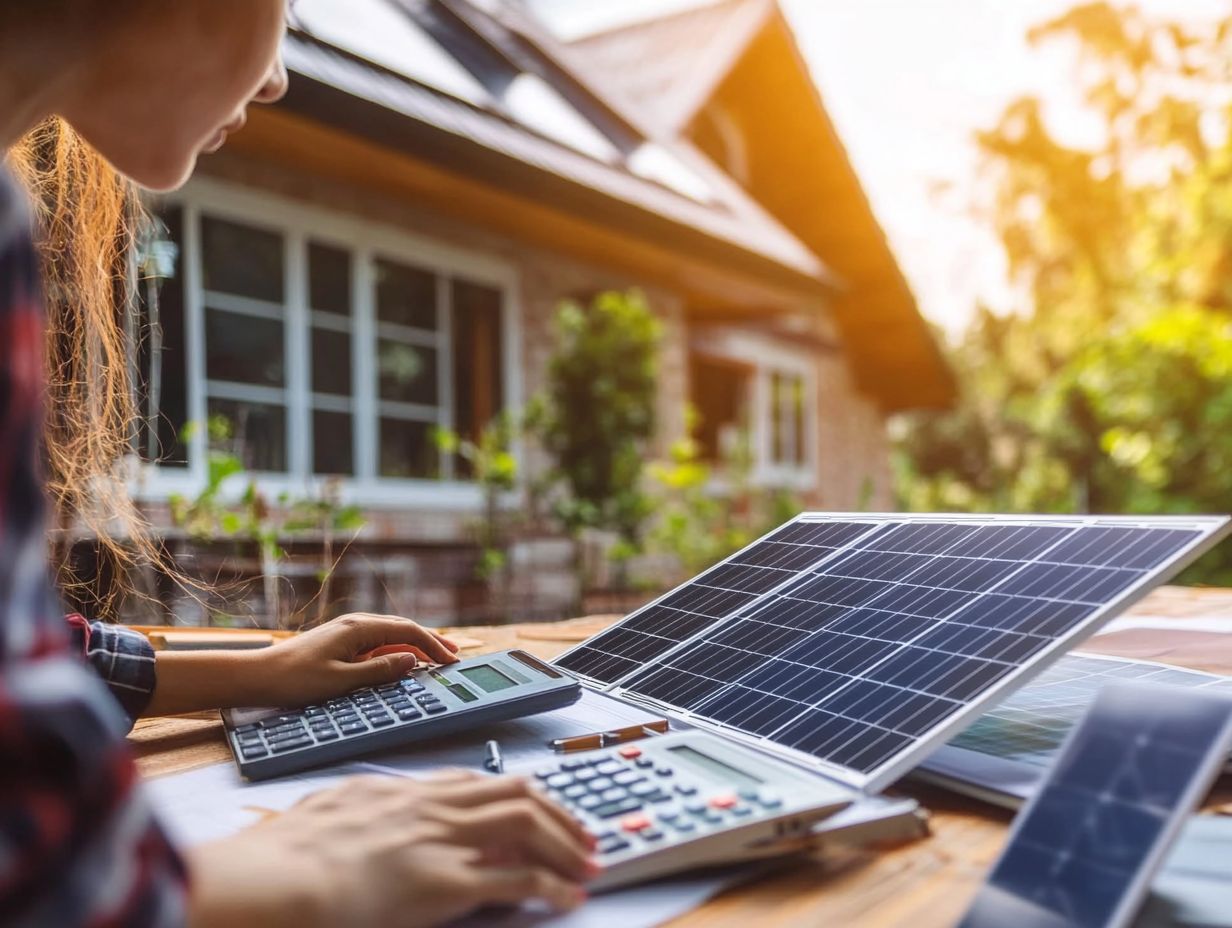
Assessing your energy needs is an essential step in determining the right size and capacity for your solar panel system. This ensures it effectively meets your household’s electricity usage. A thorough home energy audit can reveal insights into your current consumption patterns and pinpoint areas where you can improve energy efficiency. It will also guide you in calculating the ideal solar capacity needed to offset your utility bills.
This approach saves you money in the long run and contributes to a sustainable energy solution that works well.
To conduct an effective energy audit, consider these methods:
- Review your utility bills for consumption trends
- Inspect your home for energy efficiency
- Use energy monitoring apps to track usage
There are plenty of online calculators available to help you estimate the size of the solar panel system based on your personalized energy use data. Before installation, it s wise to enhance your energy efficiency by:
- Sealing air leaks
- Upgrading insulation
- Replacing outdated appliances with energy-efficient models
These steps help reduce your overall electricity usage and ensure that your solar panel system operates at its maximum potential.
Don t wait assess your energy needs today to maximize your savings!
Choosing the Right Solar Panel Company
Picking the right solar panel company is crucial for your solar journey! This decision profoundly influences the effectiveness and efficiency of your solar installation. Research various solar companies, paying close attention to their reputation, customer reviews, and the qualifications of their installers.
By comparing quotes from multiple providers, you can uncover competitive pricing for both solar equipment and installation contracts. This ensures you receive the best value for your investment in renewable energy.
Assess the warranties offered by these solar companies. A robust warranty can safeguard you against defects and ensure long-term performance. It’s also prudent to inquire about service agreements that clearly outline maintenance obligations and potential costs post-installation. This support is crucial, as it guarantees you access to professional guidance should any issues arise or if further enhancements are desired.
Qualified installers should excel in their technical skills and possess the expertise to assist you throughout the entire process from the initial consultation to long-term system monitoring making your transition to solar energy as seamless as possible.
Take the time to choose wisely! Your solar investment depends on it.
Installation Process
The installation process of solar panels unfolds as a meticulously planned series of steps, tailored to ensure seamless integration of the solar power system into your home. Before proceeding, it’s essential to know what to ask before installing solar panels. Engaging a professional installer is paramount; they will assess your specific needs, taking into account roof conditions and local permit requirements.
Typically, the process involves:
- Mounting the solar panels
- Connecting the electrical wiring to the power inverter
- Ensuring adherence to local utility standards
This systematic approach maximizes energy efficiency and establishes a solid foundation for future maintenance and performance monitoring.
Remember, a well-executed installation is key to enjoying the benefits of solar energy for years to come!
Step-by-Step Guide to Installing Solar Panels
Installing solar panels requires a systematic approach. A step-by-step guide can help you navigate the process effortlessly, from initial assessment to activation.
Begin with a comprehensive evaluation of your energy needs. Then, choose the right solar technologies and equipment, including solar panels and devices that convert sunlight into electricity.
As the installation progresses, the next steps will involve securing battery storage for any excess energy, connecting your system to the local utility grid, and setting up ongoing monitoring to ensure optimal performance and efficiency.
During your initial consultation, discuss any potential site limitations, such as shading from trees or nearby structures, which could impact sunlight exposure. Safety planning is equally important; ensure the installers use proper scaffolding and protective gear.
After the installation, a thorough inspection will confirm that all components are securely connected.
Take the time to learn about the monitoring system. This knowledge will enable you to track performance effectively. Tips on maintenance, such as keeping the panels clean and scheduling regular check-ups, will enhance long-term efficiency and ensure your investment continues to shine.
Maintaining and Monitoring Your Solar Panels
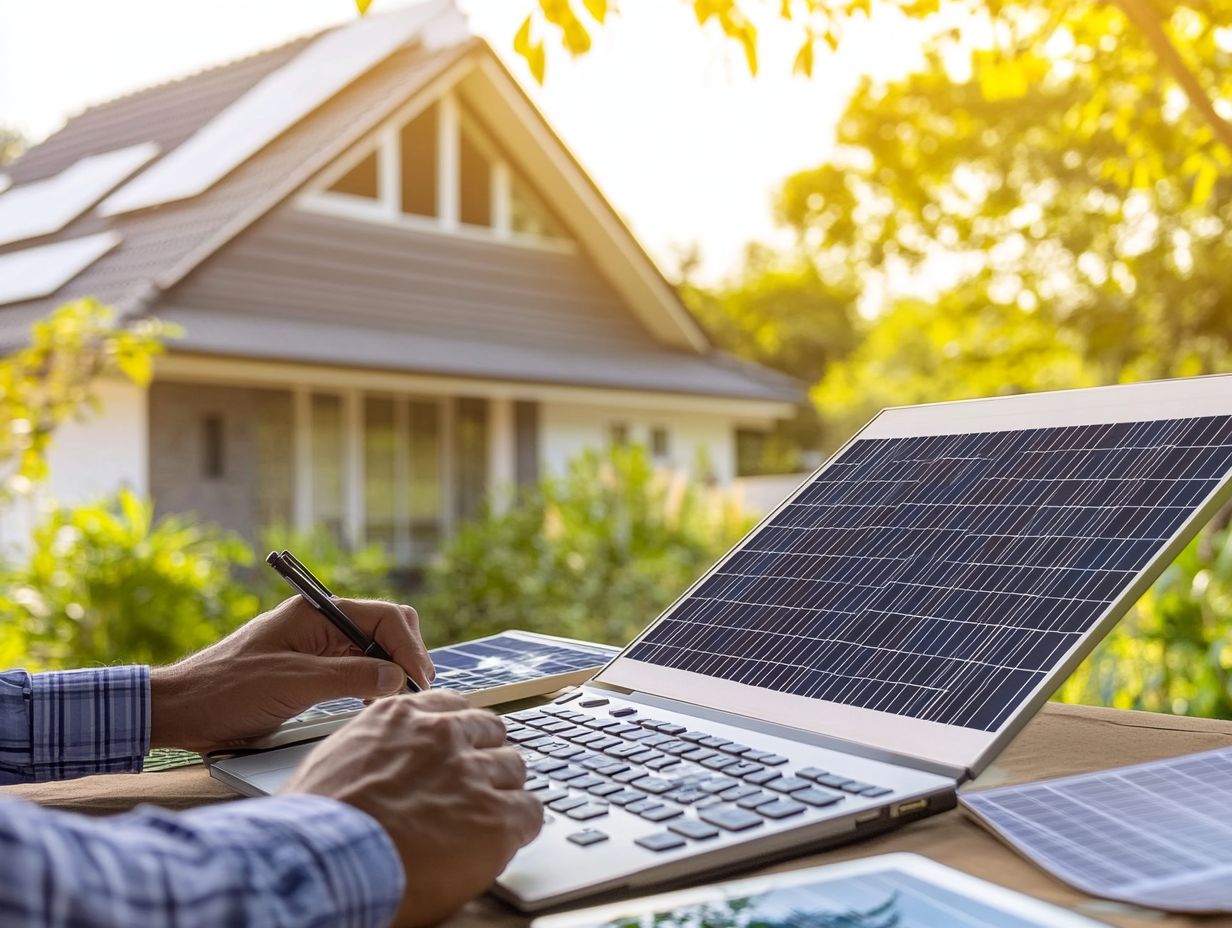
Maintaining and monitoring your solar panels is crucial for achieving optimal performance and longevity. This allows you to fully enjoy the benefits of your solar investment.
Regular maintenance like cleaning the panels and inspecting for wear and tear plays a significant role in sustaining energy efficiency and minimizing downtime.
Leveraging advanced system monitoring technologies enables you to track energy production, evaluate overall system performance, and spot potential issues early. This proactive approach ensures that your solar system continues to deliver exceptional value over the long term.
Tips for Optimal Performance and Longevity
To ensure your solar panels perform optimally and enjoy a long lifespan, adopting certain practices can significantly enhance their effectiveness over time.
Stay ahead of potential issues with regular maintenance! Cleaning the panels to remove dirt and debris is essential. Monitor energy efficiency trends and proactively tackle any issues that may arise, such as shading or damage to your solar equipment, to maximize energy production.
Establish a routine inspection schedule every six months to catch potential problems before they escalate. During these inspections, look for signs of wear and tear, such as loose connections or discoloration.
When it comes to cleaning, use non-abrasive materials to avoid scratching the surface. Aim to do this in the morning or late afternoon to prevent heat-related damage.
If you re unsure about handling these tasks yourself, consider enlisting professional maintenance services. They possess the expertise to troubleshoot common issues, detect drops in efficiency, and provide timely solutions, ensuring your investment in solar technology is well protected.
Financial Considerations
Thinking about going solar? Grasping the financial implications is crucial, as various factors play a role in determining solar costs and potential savings.
It’s wise for homeowners to investigate solar financing options, such as loans and leasing arrangements. These can alleviate initial expenses while optimizing your return on investment.
Furthermore, taking advantage of available incentives and rebates can greatly diminish overall costs. This ultimately leads to a reduced electric bill as the solar panel system starts to counterbalance traditional energy consumption.
Explore your options today to start saving!
By understanding these financial aspects and maintaining your system, you ll maximize your investment and enjoy sustainable energy for years to come.
Costs and Savings of Solar Panel Installation
Understanding the costs and savings tied to solar panel installation is crucial for homeowners considering this investment in renewable energy.
The initial installation costs can vary based on the size of your solar system, quality of equipment, and labor expenses.
Many homeowners find that the savings on electric bills, along with available incentives and rebates, can significantly offset these costs.
By calculating your potential long-term savings and factoring in federal tax credits, you can make informed decisions about the financial viability of solar energy.
Consider how much you can save on your monthly electric bills. Analyze your past electricity usage to estimate future savings based on the energy your solar installation will generate.
Calculate your return on investment by dividing the net cost of your system by the annual savings from reduced utility bills.
Stay informed about local incentives and rebates to make your solar setup more affordable and an attractive option for embracing renewable energy solutions.
This approach gives you a clearer understanding of the overall financial landscape surrounding solar power.
Frequently Asked Questions
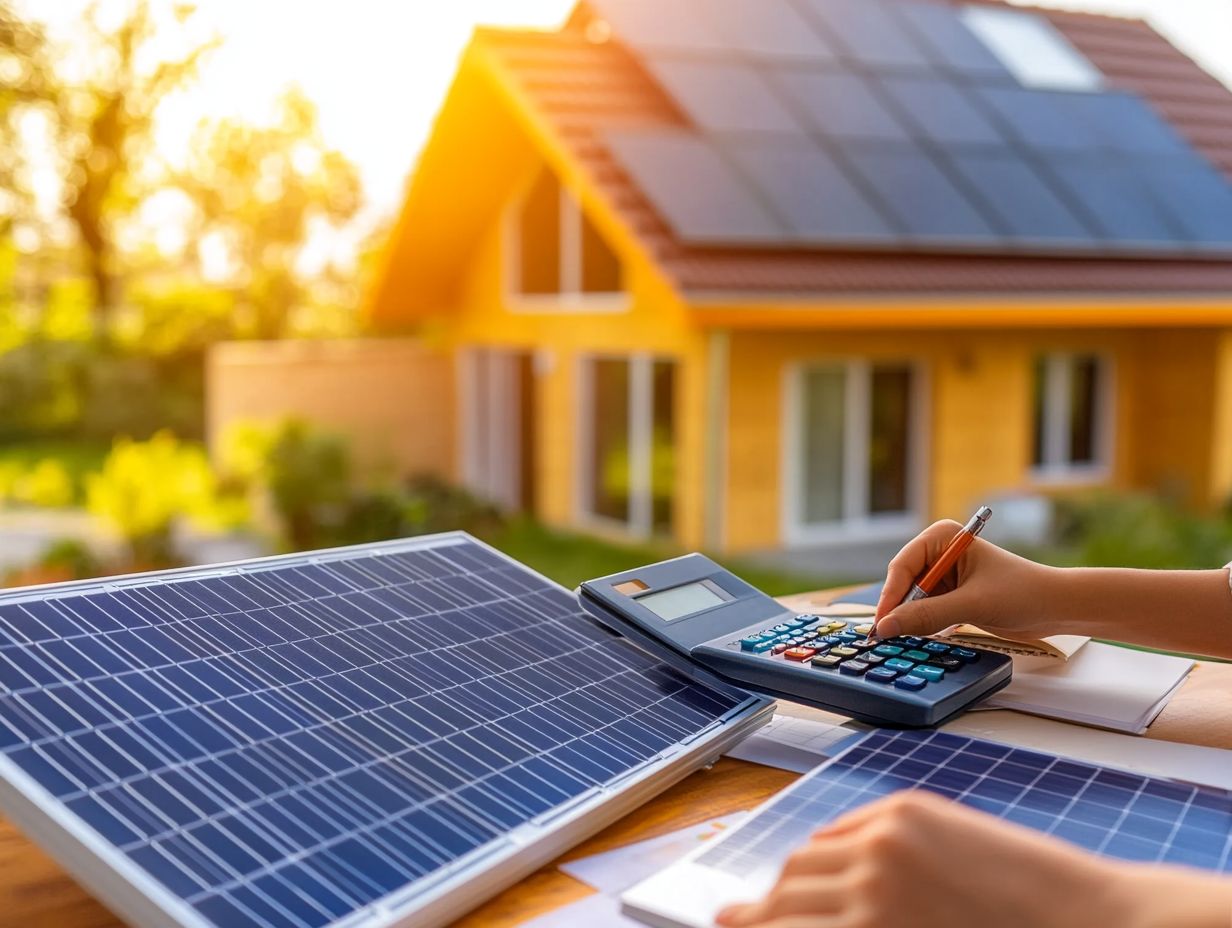
What factors should I consider before planning for solar panel installation?
Consider your energy needs, budget, location, roof type, and available incentives and rebates.
What are the steps involved in planning for solar panel installation?
Evaluate your energy needs, conduct a site survey, choose the best panel location and orientation, select a reputable installer, and obtain necessary permits.
How can I determine the size of the solar panel system I need?
Calculate your average daily energy consumption, considering future increases. This helps determine the number of panels and their wattage needed.
What type of maintenance is required for solar panels?
Solar panels require minimal maintenance, but regular cleaning and inspection are recommended for optimal performance.
This includes removing debris, checking for damaged components, and monitoring energy production.
How do I choose a reputable installer for my solar panel installation?
Research factors such as experience, certifications, customer reviews, and warranties. Get multiple quotes for comparison before deciding.
What are the available incentives and rebates for solar panel installation?
Incentives and rebates vary by location. They may include federal tax credits, state and local incentives, and net metering programs.
Researching these options can unlock incredible savings!




